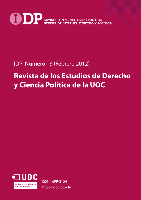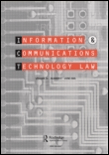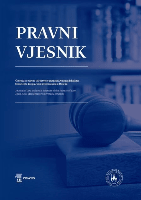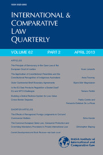
IDP-Internet Law and Politics
Scope & Guideline
Shaping Tomorrow's Digital Governance Today.
Introduction
Aims and Scopes
- Cyber Law and Digital Rights:
The journal extensively covers topics related to cyber law, addressing issues such as data protection, privacy rights, and the legal implications of emerging technologies like artificial intelligence and blockchain. - Impact of Technology on Legal Systems:
Research published in the journal explores how technological innovations are reshaping legal processes, including the digitization of justice, algorithmic decision-making in courts, and the implications for civil liberties. - Regulatory Frameworks for Emerging Technologies:
The journal discusses the development and reform of legal frameworks to regulate new technologies, examining the challenges posed by innovations such as deepfakes, predictive policing, and online platforms. - Social and Ethical Implications of Internet Governance:
The journal emphasizes the socio-ethical dimensions of internet law, including issues of hate speech, discrimination, and the responsibilities of social media platforms in curbing misinformation. - International and Comparative Perspectives:
Research often includes comparative analyses of legal approaches across different jurisdictions, particularly in relation to EU regulations and their impact on member states.
Trending and Emerging
- Artificial Intelligence and Legal Liability:
There is a growing emphasis on the legal implications of AI technologies, particularly concerning liability issues related to AI decision-making and the need for new regulatory frameworks. - Data Protection and Privacy in a Digital Age:
Recent publications have increasingly addressed the complexities of data protection laws, especially in light of recent legal developments in Europe and beyond regarding personal data handling. - Algorithmic Justice and Bias:
A trend towards examining how algorithms can perpetuate bias and discrimination has emerged, with a focus on creating fair and accountable AI systems. - Digital Platform Regulation:
The journal is seeing a surge in articles discussing the legal challenges and regulatory needs of digital platforms, particularly in relation to e-commerce, user rights, and content moderation. - Cybersecurity and International Law:
There is an emerging focus on the intersection of cybersecurity issues and international law, reflecting concerns over state-sponsored cyber activities and the need for global governance frameworks.
Declining or Waning
- Traditional Intellectual Property Rights:
While intellectual property remains relevant, discussions specifically centered on traditional copyright issues have decreased as focus shifts towards the implications of AI and digital innovations. - Cybercrime without Technological Context:
There has been a noticeable decline in studies addressing cybercrime solely from a criminal law perspective, with more emphasis now placed on the interplay between technology and legal frameworks. - General Discussions on Internet Governance:
Broad discussions on internet governance without specific case studies or regulatory implications are becoming less frequent, as researchers prefer to delve into more nuanced and contemporary issues. - Non-Digital Legal Practices:
Research exploring legal practices that are not directly influenced by digital technologies has decreased, reflecting a growing recognition of the importance of digital contexts in contemporary law. - Crisis Management in Non-Digital Contexts:
Themes around crisis management unrelated to digital phenomena have waned, as the focus has shifted to how crises like COVID-19 influence digital law and online interactions.
Similar Journals

Annual Review of Law and Social Science
Navigating Contemporary Issues Through Rigorous ReviewsThe Annual Review of Law and Social Science, published by ANNUAL REVIEWS, is an essential interdisciplinary journal that bridges the domains of law, sociology, and political science. Established in 2006, this pivotal resource has consistently been recognized for its scholarly excellence, achieving a Q1 ranking in both the Law and Sociology and Political Science categories as of 2023. With a remarkable Scopus ranking that places it in the 93rd percentile among law journals, it serves as a vital platform for researchers and professionals seeking to engage with comprehensive reviews of contemporary issues at the intersection of these fields. Although not an open-access journal, its contributions are fundamental for advancing scholarship and fostering deeper insights into the relationship between social dynamics and legal frameworks. The journal's rigorous annual reviews provide valuable syntheses of the latest research, making it an indispensable resource for academics, policymakers, and students alike.

Revista Chilena de Derecho y Tecnologia
Illuminating the Convergence of Law and Technology.Revista Chilena de Derecho y Tecnología is a distinguished open access journal published by Universidad de Chile, Facultad de Derecho, dedicated to exploring the interplay between law and technology in a rapidly evolving digital landscape. Since its inception, the journal has established itself as an essential resource for researchers, legal professionals, and students, facilitating critical dialogue and scholarship in this interdisciplinary field. With an impactful presence in the academic community, the journal has achieved notable rankings, including a Q1 classification in Law and a Q3 classification in both Computer Networks and Communications and Information Systems for the year 2023. Furthermore, the journal offers broad accessibility to its readers, having adopted an open access model since 2012, ensuring that cutting-edge research is available to a wider audience. Based in Santiago, Chile, the Revista Chilena de Derecho y Tecnología serves as a vital platform for advancing knowledge, fostering innovation, and responding to the legal challenges posed by emerging technological advancements, thereby contributing significantly to its respective fields.

European Review of Private Law
Exploring Innovations in European Legal FrameworksEuropean Review of Private Law, published by KLUWER LAW INTERNATIONAL, is a distinguished academic journal that provides a comprehensive platform for scholarly research in the field of private law. With an ISSN of 0928-9801 and an E-ISSN of 1875-8371, this periodical features insightful articles, case studies, and reviews that contribute to the ongoing dialogue among legal scholars and practitioners. Although classified in the 2023 Q4 quartile within the law category, this journal fosters important discussions on pertinent aspects of private law, driving forward legal scholarship particularly in a European context. The journal operates under a traditional subscription model, ensuring a rigorous peer-review process for all submitted work. Its address is ZUIDPOOLSINGEL 2, PO BOX 316, 2400 AH ALPHEN AAN DEN RIJN, NETHERLANDS. The role of the European Review of Private Law is vital, serving as a conduit for fresh perspectives and developments that impact both legal theory and practice. Whether you are a researcher, a legal practitioner, or a student, this journal offers invaluable insights that resonate deeply within the legal community.

Law Technology and Humans
Navigating the Evolving Challenges of Tech LawLaw Technology and Humans is an innovative open-access journal published by Queensland University of Technology in Australia. Since its inception in 2019, it has emerged as a vital platform for scholarly discourse at the intersection of law, technology, and society, addressing pertinent challenges and advancements from 2019 to 2024. With categories spanning from Law and Social Sciences to Biotechnology and Information Systems, the journal caters to a diverse audience, achieving respectable rankings within its field—ranked #382 in Social Sciences (Law) and within the 62nd percentile in 2023. As a practitioner or researcher navigating the rapidly evolving landscape of tech law, Law Technology and Humans serves as an essential resource, fostering interdisciplinary collaboration and providing critical insights into the implications of technological innovation. By maintaining an open-access format, the journal enhances accessibility, promoting widespread engagement and knowledge sharing among academics, professionals, and students globally.

Information & Communications Technology Law
Pioneering Research in Digital Law and EthicsInformation & Communications Technology Law, an esteemed journal published by Routledge Journals, Taylor & Francis Ltd, serves as a vital platform for the dissemination of critical research and analysis in the intersecting fields of law, communication, and computer science. Established in 1992, this journal has continuously evolved to address the dynamic landscape of information technology and its legal implications, maintaining a significant H-Index that reflects its scholarly impact. With a notable impact factor that places it in the second quartile for communication and law disciplines, and in the third quartile for computer science applications as of 2023, it ranks impressively within the Scopus Metrics—highlighting its relevance and reach among global academia. Covering vital topics from data privacy to intellectual property rights in the digital age, the journal appeals to researchers, practitioners, and students alike by offering insightful articles that explore contemporary issues and emerging trends within ICT law. Although it does not currently offer open access options, its comprehensive articles and reviews are indispensable for anyone seeking to understand the complexities of technology regulation and legal frameworks.

Pravni Vjesnik
Elevating Legal Inquiry, Bridging Communities.Pravni Vjesnik is a peer-reviewed academic journal published by the Pravni Fakultet Sveučilišta Josipa Jurja Strossmayera & Osijek, primarily focusing on the field of law within the social sciences. Since transitioning to an Open Access model in 2016, the journal has broadened its accessibility, allowing researchers, professionals, and students to engage with diverse legal scholarship without subscription barriers. With an ISSN of 0352-5317 and an E-ISSN of 1849-0840, Pravni Vjesnik plays a crucial role in disseminating knowledge and fostering discourse in the legal community, particularly within the context of the Croatian legal system and broader European legal frameworks. Although it holds a rank of #760 out of 1025 in the Scopus database, placing it in the 25th percentile of law journals, its commitment to quality and relevance ensures its importance as a resource for rigorous academic inquiry. The journal's scope is anticipated to expand from 2019 to 2024, promoting ongoing research in contemporary legal issues. This dedication to publishing comprehensive and impactful studies makes Pravni Vjesnik an essential platform for those involved in the legal field.

MINNESOTA LAW REVIEW
Fostering Critical Engagement in Legal StudiesMINNESOTA LAW REVIEW is a prestigious academic journal dedicated to advancing legal scholarship and discourse, published by the MINN LAW REVIEW FOUND in the United States. Established in 1976, this journal has become a cornerstone in the field of law, achieving an impressive Q1 ranking in the Law category for 2023, underscoring its significance and influence in legal studies, with a Scopus rank placing it in the 65th percentile among social sciences law journals. The ISSN number for both print and electronic editions is 0026-5535, ensuring broad accessibility to its scholarly contributions. With a commitment to publishing innovative and analytical articles that address contemporary legal issues, the MINNESOTA LAW REVIEW serves as an essential resource for researchers, students, and legal professionals seeking to deepen their understanding and engage with critical legal concepts. While it does not currently provide open access, its wide array of topics spans various disciplines within law, fostering a vibrant academic community dedicated to the exploration of legal principles and their applications. The journal’s editorial office can be found at 229 19TH AVE SOUTH, UNIVERSITY OF MINNESOTA, MINNEAPOLIS, MN 55455, where a team of experts curates content that reflects the evolving landscape of legal thought.

Melbourne University Law Review
Cultivating a Platform for Legal ExcellenceMelbourne University Law Review, published by the MELBOURNE UNIV LAW REVIEW ASSOC, stands as a pivotal journal in the realm of legal scholarship in Australia and beyond. With an ISSN of 0025-8938 and an E-ISSN of 1839-3810, this esteemed publication has been a cornerstone for legal discourse since its inception. Designed to foster rigorous analysis and extensive debate, the journal covers diverse aspects of law, providing researchers, practitioners, and students an invaluable platform to engage with contemporary legal issues. The journal has demonstrated a commitment to high-quality scholarship, achieving a Q2 ranking in Law for 2023, further solidifying its importance within the academic community. Although not an open-access publication, the Melbourne University Law Review ensures that contributions remain accessible through institutional subscriptions, enhancing its reach and reinforcing its role as a critical resource for those dedicated to advancing legal knowledge and practice. For all stakeholders in the field of law—be they established academics or emerging professionals—this journal serves as a vital repository of innovative ideas and legal analysis.

International & Comparative Law Quarterly
Illuminating Global Legal Frameworks.International & Comparative Law Quarterly is a prestigious academic journal published by Cambridge University Press, renowned for its rigorous scholarship in the fields of law, political science, and international relations. With an impressive impact factor and classified in the Q1 category for both Law and Political Science and International Relations, the journal stands out as a leading platform for disseminating high-quality research. Established in 1952, it has been pivotal in shaping discourse around comparative and international legal frameworks through carefully curated articles, case studies, and analyses. Although not open access, its comprehensive content provides invaluable insights into contemporary legal challenges and political dynamics, making it essential reading for researchers, professionals, and students alike. With ongoing contributions from a diverse range of scholars, the journal aims to foster a deeper understanding of law in a global context and provide readers with the tools to navigate complex legal landscapes.

WASHINGTON LAW REVIEW
Your Gateway to Pioneering Legal InsightsWASHINGTON LAW REVIEW, published by the University of Washington School of Law, is a premier legal journal that plays an essential role in the dissemination of scholarly work in the field of law. With a longstanding commitment to excellence, this journal has been pivotal in shaping legal discourse since its inception. It is ranked in the Q2 quartile in Law, as per 2023 evaluations, and holds a notable position within the top 54th percentile of its category on Scopus. The journal’s extensive publication history, covering years from 1973 to 2024, provides a rich repository of legal scholarship, making it a valuable resource for researchers, practitioners, and students alike. While the journal does not currently offer open access, its authoritative articles cover a diverse array of topics within legal studies, ensuring that the most relevant and impactful discussions are accessible to the academic community and beyond. For those looking to stay informed about cutting-edge legal issues and advancements, WASHINGTON LAW REVIEW remains an indispensable asset in the pursuit of knowledge and advocacy in the realm of law.